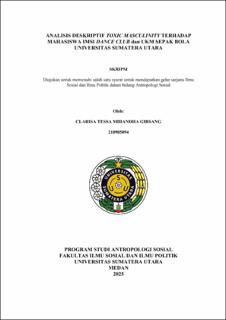| dc.contributor.advisor | Savitri, Nita | |
| dc.contributor.author | Girsang, Clarisa Tessa Mirandha | |
| dc.date.accessioned | 2025-06-30T02:00:02Z | |
| dc.date.available | 2025-06-30T02:00:02Z | |
| dc.date.issued | 2025 | |
| dc.identifier.uri | https://repositori.usu.ac.id/handle/123456789/104676 | |
| dc.description.abstract | This study discusses the concept of Masculinity which generally varies in a place and culture, but ultimately still narrows down to the nature of Traditional Masculinity which only prioritizes men's physical strength and is far from gentleness. If this interpretation is carried out forcibly and excessively, it can lead to Toxic Masculinity. Toxic Masculinity is a behavior that requires men to stay away from everything feminine, and to have a strong physical and mentality. This study aims to identify and analyze how the concept of Masculinity is understood and interpreted differently by students who have different activities, and to find out what factors underlie the formation of the concept. The author will also describe the experiences of the Informants in everyday life with each chosen hobby. The informants in this study focused on 4 IMSI Dance Club Students (dominantly preferred by women) and 4 UKM Football Students (dominantly preferred by men). This study uses the Qualitative Descriptive Analysis method with an Ethnographic approach with primary data collection techniques in the form of observation, in-depth interviews, and documentation. The theories used in this study are the Cultural Pattern Theory by Ruth Bennedic and the Social Construction Theory by Peter L. Berger and Thomas Luckmann.
The results of this study indicate that there are different concepts of Masculinity between male Football UKM and male IMSI Dance Club. Male Football UKM prioritizes physical strength as a form of their Masculinity (Traditional Masculinity), while male IMSI Dance Club emphasizes more on the nature of respecting others and wearing makeup on the face rather than having physical strength (Modern Masculinity). The factors that underlie their views are Family, Social Media and Friendship Environment. In their experiences in everyday life, male IMSI Dance Club tends to experience Toxic Masculinity behavior because they have abnormal personalities or do not comply with the dominant standards set by society, so that they are forced to choose activities that are predominantly liked by men (Toxic Masculinity). While male Football UKM, instead of getting unpleasant behavior, they are actually proud of their family environment. From the results of this study, it is hoped that the Campus can be part of the effort to dismantle the norms of Masculinity that are limiting and detrimental to men. | en_US |
| dc.language.iso | id | en_US |
| dc.publisher | Universitas Sumatera Utara | en_US |
| dc.subject | Masculinity | en_US |
| dc.subject | Toxic Masculinity | en_US |
| dc.subject | IMSI Dance Club | en_US |
| dc.subject | UKM Football | en_US |
| dc.subject | University of Sumatera Utara | en_US |
| dc.title | Analisis Deskriptif Toxic Masculinity terhadap Mahasiswa IMSI Dance Club dan UKM Sepak Bola Universitas Sumatera | en_US |
| dc.title.alternative | Descriptive Analysis of Toxic Masculinity Against IMSI Dance Club Students and UKM Football University of Sumatera Utara | en_US |
| dc.type | Thesis | en_US |
| dc.identifier.nim | NIM210905094 | |
| dc.identifier.nidn | NIDN0025016102 | |
| dc.identifier.kodeprodi | KODEPRODI82201#Antropologi Sosial | |
| dc.description.pages | 160 Pages | en_US |
| dc.description.type | Skripsi Sarjana | en_US |
| dc.subject.sdgs | SDGs 5. Gender Equality | en_US |


